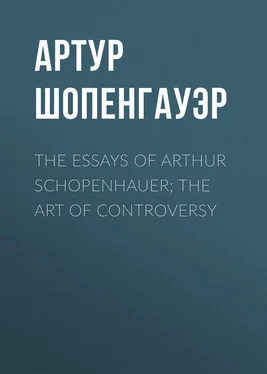Артур Шопенгауэр - The Essays of Arthur Schopenhauer; the Art of Controversy
Здесь есть возможность читать онлайн «Артур Шопенгауэр - The Essays of Arthur Schopenhauer; the Art of Controversy» — ознакомительный отрывок электронной книги совершенно бесплатно, а после прочтения отрывка купить полную версию. В некоторых случаях можно слушать аудио, скачать через торрент в формате fb2 и присутствует краткое содержание. Жанр: Философия, literature_19, foreign_antique, foreign_prose, на английском языке. Описание произведения, (предисловие) а так же отзывы посетителей доступны на портале библиотеки ЛибКат.
- Название:The Essays of Arthur Schopenhauer; the Art of Controversy
- Автор:
- Жанр:
- Год:неизвестен
- ISBN:нет данных
- Рейтинг книги:3 / 5. Голосов: 1
-
Избранное:Добавить в избранное
- Отзывы:
-
Ваша оценка:
- 60
- 1
- 2
- 3
- 4
- 5
The Essays of Arthur Schopenhauer; the Art of Controversy: краткое содержание, описание и аннотация
Предлагаем к чтению аннотацию, описание, краткое содержание или предисловие (зависит от того, что написал сам автор книги «The Essays of Arthur Schopenhauer; the Art of Controversy»). Если вы не нашли необходимую информацию о книге — напишите в комментариях, мы постараемся отыскать её.
The Essays of Arthur Schopenhauer; the Art of Controversy — читать онлайн ознакомительный отрывок
Ниже представлен текст книги, разбитый по страницам. Система сохранения места последней прочитанной страницы, позволяет с удобством читать онлайн бесплатно книгу «The Essays of Arthur Schopenhauer; the Art of Controversy», без необходимости каждый раз заново искать на чём Вы остановились. Поставьте закладку, и сможете в любой момент перейти на страницу, на которой закончили чтение.
Интервал:
Закладка:
STRATAGEMS
I
The Extension . – This consists in carrying your opponent's proposition beyond its natural limits; in giving it as general a signification and as wide a sense as possible, so as to exaggerate it; and, on the other hand, in giving your own proposition as restricted a sense and as narrow limits as you can, because the more general a statement becomes, the more numerous are the objections to which it is open. The defence consists in an accurate statement of the point or essential question at issue.
Example 1. – I asserted that the English were supreme in drama. My opponent attempted to give an instance to the contrary, and replied that it was a well-known fact that in music, and consequently in opera, they could do nothing at all. I repelled the attack by reminding him that music was not included in dramatic art, which covered tragedy and comedy alone. This he knew very well. What he had done was to try to generalise my proposition, so that it would apply to all theatrical representations, and, consequently, to opera and then to music, in order to make certain of defeating me. Contrarily, we may save our proposition by reducing it within narrower limits than we had first intended, if our way of expressing it favours this expedient.
Example 2. – A. declares that the Peace of 1814 gave back their independence to all the German towns of the Hanseatic League. B. gives an instance to the contrary by reciting the fact that Dantzig, which received its independence from Buonaparte, lost it by that Peace. A. saves himself thus: "I said 'all German towns,' and Dantzig was in Poland."
This trick was mentioned by Aristotle in the Topica (bk. viii., cc. 11, 12).
Example 3. – Lamarck, in his Philosophic Zoologique (vol. i., p. 208), states that the polype has no feeling, because it has no nerves. It is certain, however, that it has some sort of perception; for it advances towards light by moving in an ingenious fashion from branch to branch, and it seizes its prey. Hence it has been assumed that its nervous system is spread over the whole of its body in equal measure, as though it were blended with it; for it is obvious that the polype possesses some faculty of perception without having any separate organs of sense. Since this assumption refutes Lamarck's position, he argues thus: "In that case all parts of its body must be capable of every kind of feeling, and also of motion, of will, of thought. The polype would have all the organs of the most perfect animal in every point of its body; every point could see, smell, taste, hear, and so on; nay, it could think, judge, and draw conclusions; every particle of its body would be a perfect animal and it would stand higher than man, as every part of it would possess all the faculties which man possesses only in the whole of him. Further, there would be no reason for not extending what is true of the polype to all monads, the most imperfect of all creatures, and ultimately to the plants, which are also alive, etc., etc." By using dialectical tricks of this kind a writer betrays that he is secretly conscious of being in the wrong. Because it was said that the creature's whole body is sensitive to light, and is therefore possessed of nerves, he makes out that its whole body is capable of thought.
II
The Homonymy . – This trick is to extend a proposition to something which has little or nothing in common with the matter in question but the similarity of the word; then to refute it triumphantly, and so claim credit for having refuted the original statement.
It may be noted here that synonyms are two words for the same conception; homonyms, two conceptions which are covered by the same word. (See Aristotle, Topica , bk. i., c. 13.) "Deep," "cutting," "high," used at one moment of bodies at another of tones, are homonyms; "honourable" and "honest" are synonyms.
This is a trick which may be regarded as identical with the sophism ex homonymia ; although, if the sophism is obvious, it will deceive no one.
Every light can be extinguished.
The intellect is a light.
Therefore it can be extinguished.
Here it is at once clear that there are four terms in the syllogism, "light" being used both in a real and in a metaphorical sense. But if the sophism takes a subtle form, it is, of course, apt to mislead, especially where the conceptions which are covered by the same word are related, and inclined to be interchangeable. It is never subtle enough to deceive, if it is used intentionally; and therefore cases of it must be collected from actual and individual experience.
It would be a very good thing if every trick could receive some short and obviously appropriate name, so that when a man used this or that particular trick, he could be at once reproached for it.
I will give two examples of the homonymy.
Example 1. – A.: "You are not yet initiated into the mysteries of the
Kantian philosophy."
B.: "Oh, if it's mysteries you're talking of, I'll have nothing to do with them."
Example 2. – I condemned the principle involved in the word honour as a foolish one; for, according to it, a man loses his honour by receiving an insult, which he cannot wipe out unless he replies with a still greater insult, or by shedding his adversary's blood or his own. I contended that a man's true honour cannot be outraged by what he suffers, but only and alone by what he does; for there is no saying what may befall any one of us. My opponent immediately attacked the reason I had given, and triumphantly proved to me that when a tradesman was falsely accused of misrepresentation, dishonesty, or neglect in his business, it was an attack upon his honour, which in this case was outraged solely by what he suffered, and that he could only retrieve it by punishing his aggressor and making him retract.
Here, by a homonymy, he was foisting civic honour , which is otherwise called good name , and which may be outraged by libel and slander, on to the conception of knightly honour , also called point d'honneur , which may be outraged by insult. And since an attack on the former cannot be disregarded, but must be repelled by public disproof, so, with the same justification, an attack on the latter must not be disregarded either, but it must be defeated by still greater insult and a duel. Here we have a confusion of two essentially different things through the homonymy in the word honour , and a consequent alteration of the point in dispute.
III
Another trick is to take a proposition which is laid down relatively, and in reference to some particular matter, as though it were uttered with a general or absolute application; or, at least, to take it in some quite different sense, and then refute it. Aristotle's example is as follows:
A Moor is black; but in regard to his teeth he is white; therefore, he is black and not black at the same moment. This is an obvious sophism, which will deceive no one. Let us contrast it with one drawn from actual experience.
In talking of philosophy, I admitted that my system upheld the Quietists, and commended them. Shortly afterwards the conversation turned upon Hegel, and I maintained that his writings were mostly nonsense; or, at any rate, that there were many passages in them where the author wrote the words, and it was left to the reader to find a meaning for them. My opponent did not attempt to refute this assertion ad rem , but contented himself by advancing the argumentum ad hominem , and telling me that I had just been praising the Quietists, and that they had written a good deal of nonsense too.
This I admitted; but, by way of correcting him, I said that I had praised the Quietists, not as philosophers and writers, that is to say, for their achievements in the sphere of theory , but only as men, and for their conduct in mere matters of practice ; and that in Hegel's case we were talking of theories. In this way I parried the attack.
Читать дальшеИнтервал:
Закладка:
Похожие книги на «The Essays of Arthur Schopenhauer; the Art of Controversy»
Представляем Вашему вниманию похожие книги на «The Essays of Arthur Schopenhauer; the Art of Controversy» списком для выбора. Мы отобрали схожую по названию и смыслу литературу в надежде предоставить читателям больше вариантов отыскать новые, интересные, ещё непрочитанные произведения.
Обсуждение, отзывы о книге «The Essays of Arthur Schopenhauer; the Art of Controversy» и просто собственные мнения читателей. Оставьте ваши комментарии, напишите, что Вы думаете о произведении, его смысле или главных героях. Укажите что конкретно понравилось, а что нет, и почему Вы так считаете.












